1. Early life and education
Gitanas Nausėda's early life and educational journey laid the foundation for his later career in economics and politics, marked by academic rigor and a brief, later controversial, affiliation with the Communist Party.
1.1. Birth and childhood
Gitanas Nausėda was born on 19 May 1964, in the port city of Klaipėda, located on the Baltic Sea coast. His father, Antanas Nausėda (1929-2022), was an engineer, and his mother, Stasė Nausėdienė (1931-2014), was a physics and mathematics teacher from the village of Lazdininkai. He has a sister, Vilija, born in 1959, who is an economist.
He began his secondary education at Klaipėda 5th Secondary School in 1970 and also attended the Klaipėda Music School from 1971, where he sang in the boys' choir "Gintarėlis". During summers, he often spent time at his grandparents' home in Būdviečiai village, near Tauragė.
1.2. Education
In 1981, Nausėda initially failed his mathematics exam and was unable to gain admission to Vilnius University. However, he successfully enrolled the following year, studying Industrial Economics at Vilnius University from 1982 to 1987. He continued his academic pursuits as a postgraduate student of Economics at the same university from 1987 until 1989, under the supervision of Vladas Astrauskas.
In 1988, at the age of 24, Nausėda registered to join the Communist Party of the Soviet Union (CPSU), receiving his party ticket on 27 June. This membership would later become a subject of public controversy.
From 1990 to 1992, he undertook a practical training program at the University of Mannheim in Germany, supported by a DAAD scholarship. Upon his return to Lithuania, he defended his PhD thesis, titled "Income Policy Under Inflation and Stagflation," in 1993, earning a doctorate in social sciences from Vilnius University. Since 2009, he has served as an associate professor at the Vilnius University Business School, where he also occasionally delivered economics lectures from 1987 to 2004.
2. Professional career
Before his political ascent, Gitanas Nausėda built a distinguished career in the financial sector and academia, demonstrating his expertise in economics and monetary policy.
2.1. Banking and finance career
Following the completion of his studies, Nausėda began his professional career in 1992, working at the Research Institute for Economics and Privatization until 1993. From 1993 to 1994, he served as the Head of the Financial Markets Department at the Lithuanian Competition Council.
His career in central banking began in 1994 at the Bank of Lithuania, where he initially worked in the department responsible for regulating commercial banks. He later advanced to become the Director of the Monetary Policy Department, a position he held until 2000. From 2000 to 2008, Nausėda was the chief economist and advisor to the chairman of AB Vilniaus Bankas. He then transitioned to SEB Bankas, where he worked from 2008 to 2018 as a financial analyst, chief advisor, and later as the chief economist for the bank's president.
2.2. Academic activities
Beyond his roles in banking and finance, Nausėda maintained a strong connection to academia. He hosted occasional economics lectures at Vilnius University from 1987 to 2004. Since 2009, he has held the position of associate professor at the Vilnius University Business School, contributing to economic education and research.
3. Political career
Gitanas Nausėda's political career began with his successful bid for the presidency, marking his transition from a prominent economist to the head of state, and his subsequent re-election.
3.1. 2019 Lithuanian presidential election
On 17 September 2018, Gitanas Nausėda officially announced his candidacy for the 2019 Lithuanian presidential election. He ran as an independent candidate, distinguishing himself from established political parties. His campaign focused on the promise of a "welfare state," though the specific definition of this agenda sparked considerable public discussion. He also advocated for positions such as progressive real estate tax and multiple citizenship, while opposing an increase in value added tax for defense spending.
In the first round of the election, Nausėda secured 441,396 votes, representing 31.16% of the total, finishing closely behind former Finance Minister Ingrida Šimonytė, who was endorsed by the Homeland Union. The two proceeded to a runoff election. In the second round on 26 May 2019, Nausėda decisively defeated Šimonytė, garnering 881,495 votes, or 66.53% of the total. His victory was largely attributed to his moderate, "catch-all" political profile, which appealed to a broad spectrum of voters. He was officially inaugurated as President on 12 July 2019. Prior to his own presidential bid, Nausėda had supported the 2004 election campaign of former Lithuanian President Valdas Adamkus.
3.2. 2024 Lithuanian presidential election
On 7 December 2023, President Nausėda announced his decision to seek re-election for a second term in the 2024 Lithuanian presidential election. His re-election bid was notably endorsed by the Lithuanian Social Democratic Party and the Lithuanian Regions Party.
The first round of the election took place on 12 May 2024. Nausėda secured the highest number of votes, with 627,851 votes, or 46% of the total. However, as he did not achieve an outright majority, he advanced to a runoff election against his 2019 opponent, Prime Minister Ingrida Šimonytė, who received 16% of the votes. The second round was held on 26 May 2024. Nausėda was re-elected for his second term with a commanding 879,731 votes, representing 75.58% of the total, once again defeating Šimonytė.
4. Presidency (2019-present)
Gitanas Nausėda's presidency, which began in July 2019, has been defined by his active engagement in both domestic and foreign policy, navigating complex international relations and internal political dynamics.
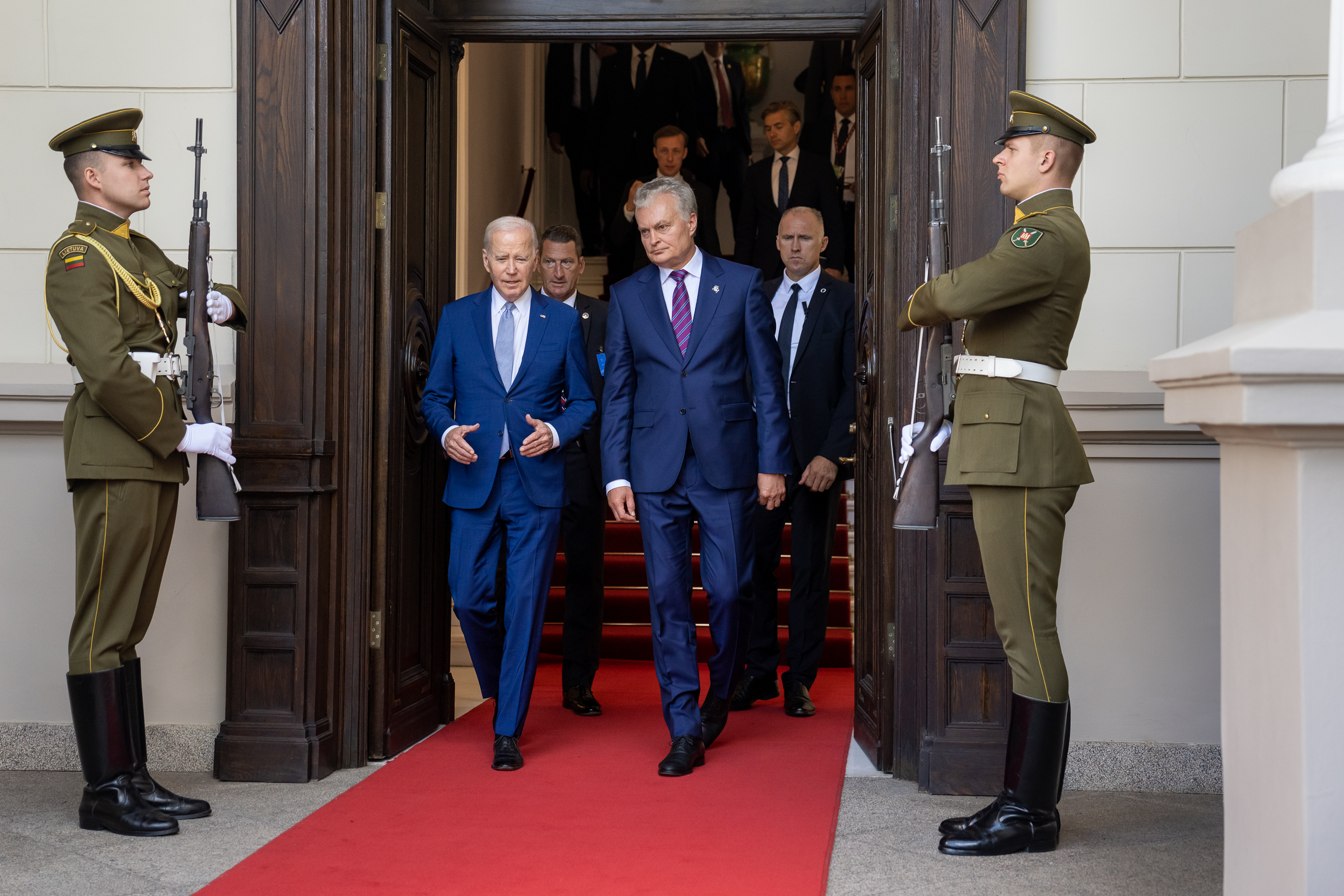
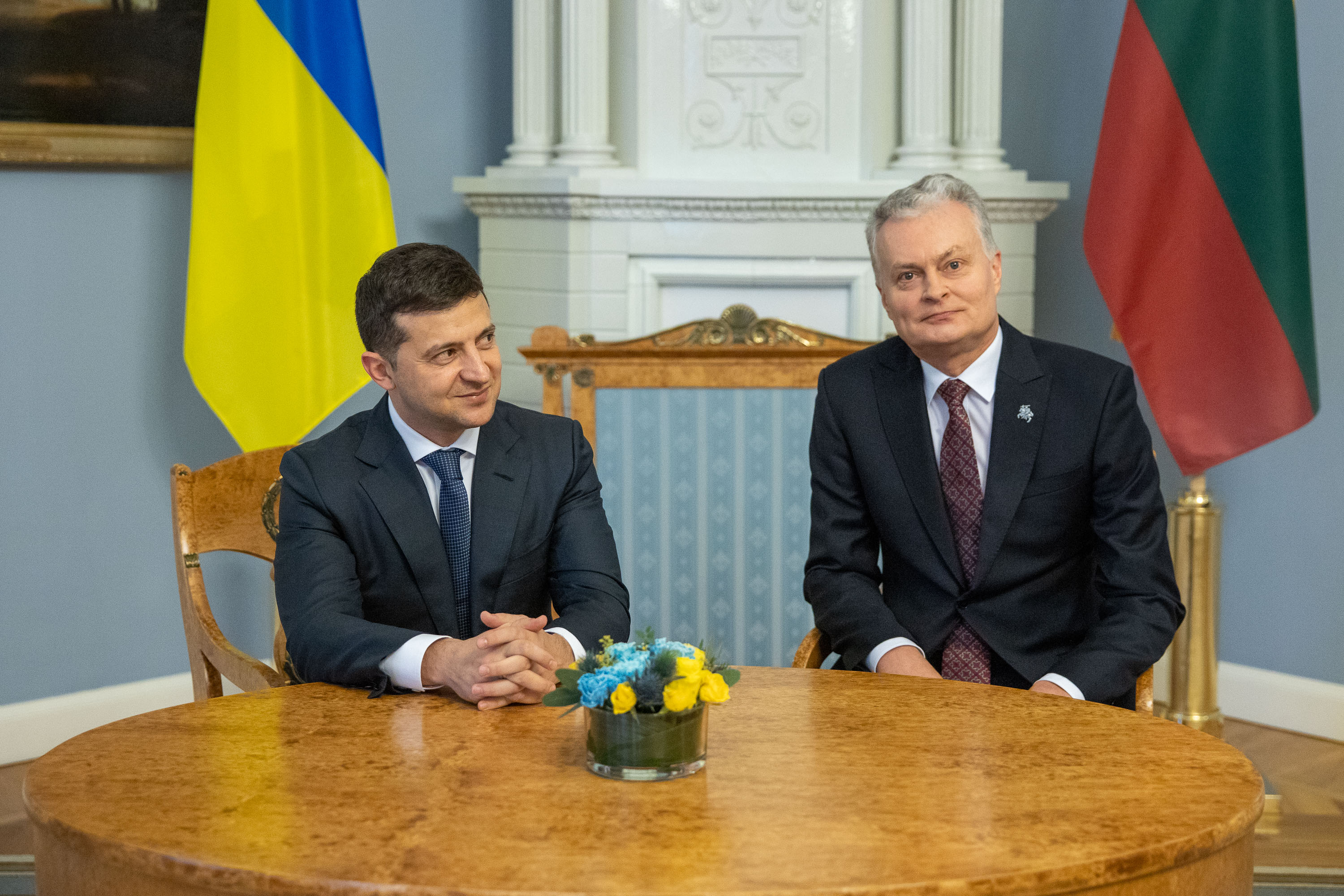
Four days after his inauguration, on 16 July 2019, Nausėda made his first foreign visit as president to Warsaw, Poland, to meet with President Andrzej Duda. On 18 July, he presented acting Prime Minister Saulius Skvernelis's candidacy to continue his duties. Within a month of taking office, Nausėda was recognized as the most trusted politician in Lithuania, according to polls conducted by the Lithuanian National Radio and Television (LRT).
4.1. Foreign policy
Nausėda's foreign policy approach has consistently emphasized Lithuania's role in regional security and the promotion of democratic values, particularly in its relations with neighboring countries and major global powers.
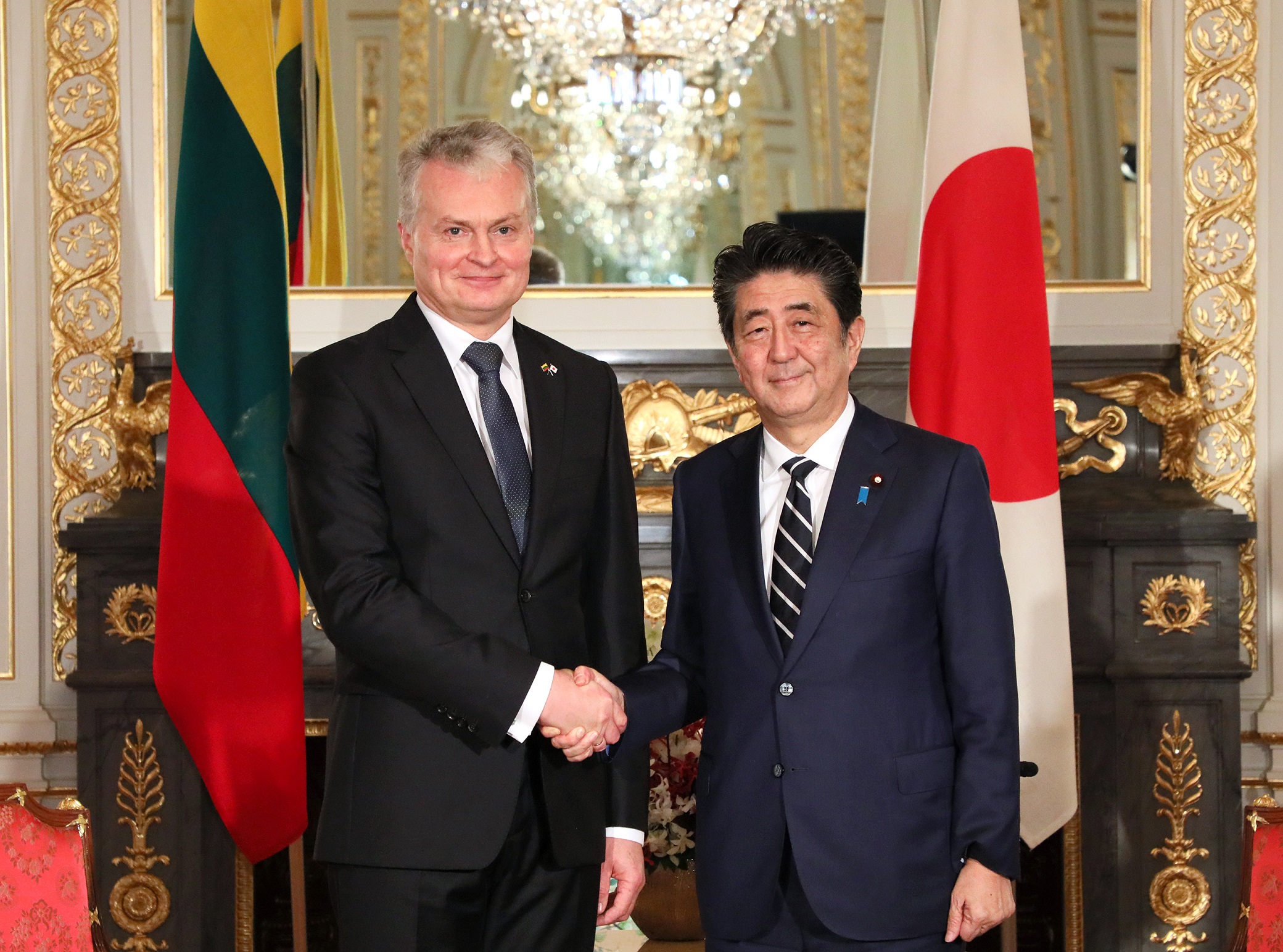
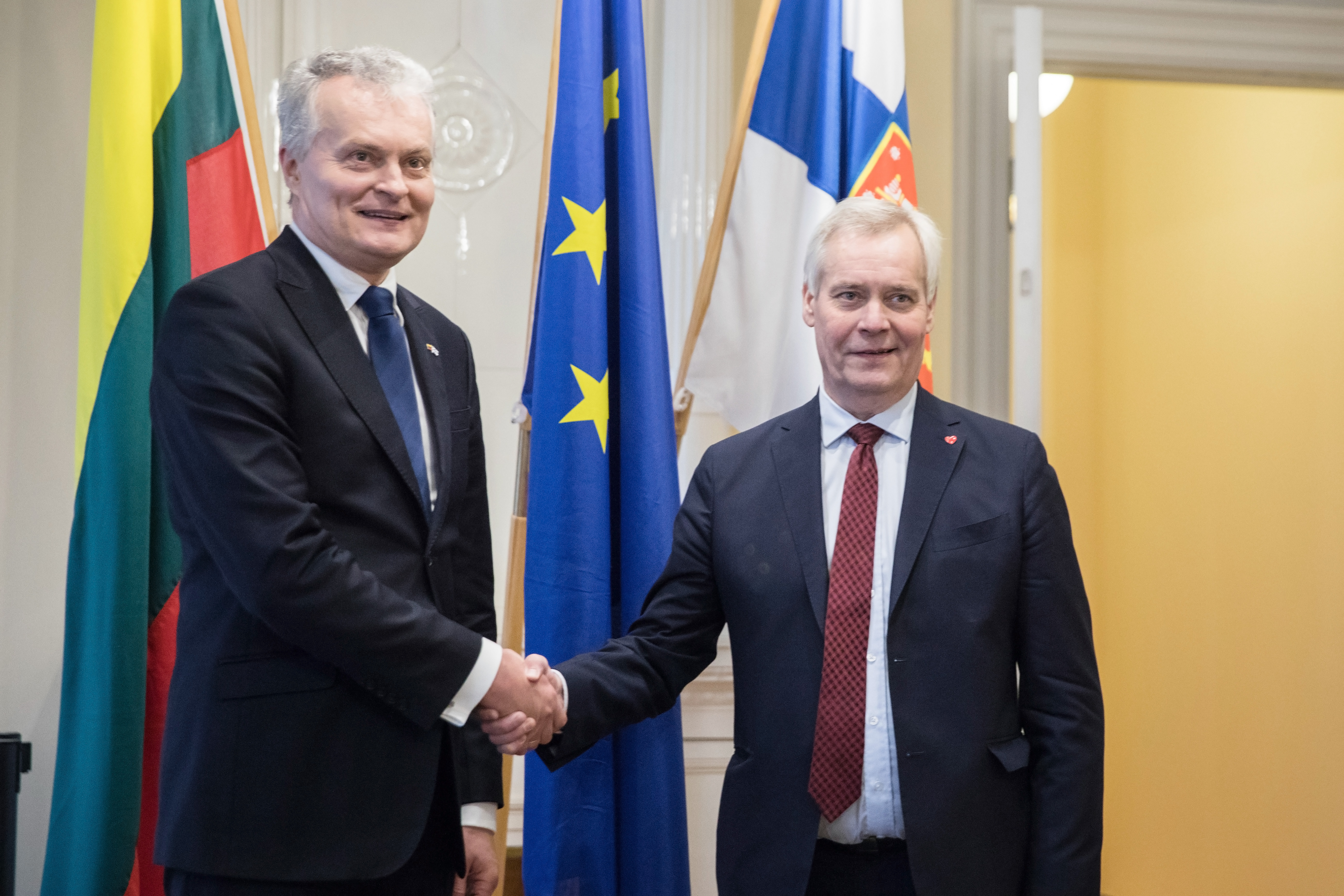
4.1.1. Belarus
In April 2020, President Nausėda held the first presidential tête-à-tête between Lithuania and Belarus in 10 years with Belarusian President Alexander Lukashenko. However, following the disputed 2020 Belarusian presidential elections and the subsequent crackdown on protestors by the Lukashenko government, Nausėda's stance hardened. Belarusian opposition candidate Sviatlana Tsikhanouskaya fled to Lithuania, and Nausėda's leadership during this crisis significantly augmented Lithuania's role among European Union nations. On 12 August, he ordered Lithuania to open its borders for all Belarusians seeking humanitarian aid. That same day, he presented a three-point plan for crisis settlement, supported by Latvia and Poland, which included a call for a national council comprising the Belarusian Government and civilian society. In an interview on 13 August, Nausėda declared Lukashenko "no longer the legitimate leader."
Nausėda has also been a vocal critic of the safety of the Astravets Nuclear Power Plant in Belarus. In May 2020, he encouraged Armenia to share its nuclear safety experience from the Armenian Nuclear Power Plant with Belarus due to concerns over Astravets. On 23 May 2021, in the immediate aftermath of the hijacking of Ryanair Flight 4978, which led to the arrest of two journalists critical of the Lukashenko regime, Nausėda called for EU recognition of Belarusian airspace as "unsafe for civilian aviation" and demanded the immediate release of journalist Roman Protasevich. By that evening, he had secured the support of both Latvian and Estonian leaders in recognizing Belarusian airspace as unsafe.
4.1.2. Poland
Nausėda has actively pursued improved relations with Poland, establishing himself as a personal ally of the Polish leadership. His first foreign visit as president was to Warsaw on 16 July 2019, where he met with President Andrzej Duda. During this visit, there were calls for him to foster a more personal relationship with Poland. Nausėda also publicly rejected any attempts by European Union leaders to sanction Poland over its actions concerning the Supreme Court of Poland and the country's judiciary.
On 22 November 2019, Nausėda and Duda, accompanied by the First Lady of Poland Agata Kornhauser-Duda, participated in the state funeral in Vilnius for commanders and participants of the January Uprising (1863-1864) against Tsarist rule. During his visit, Duda emphasized the importance of unity among Central European nations for their independence. In January 2020, Nausėda joined Duda in withdrawing from the 5th World Holocaust Forum, criticizing the event for giving a speaking slot to Russian President Vladimir Putin, who had engaged in a historical revisionist campaign against Poland's World War II history. In July 2020, Nausėda and Duda also participated in the 610th anniversary commemoration of the Battle of Grunwald.
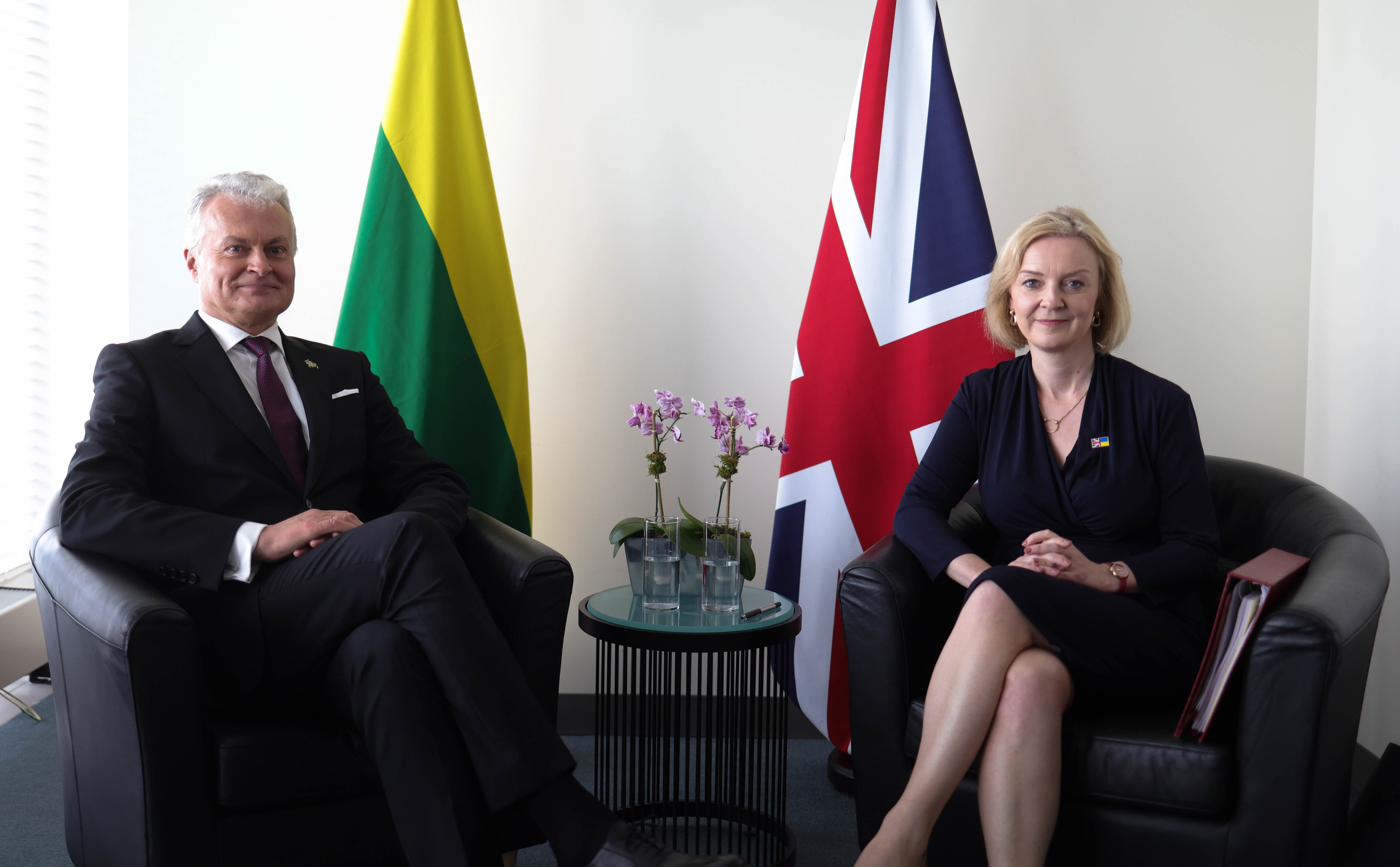
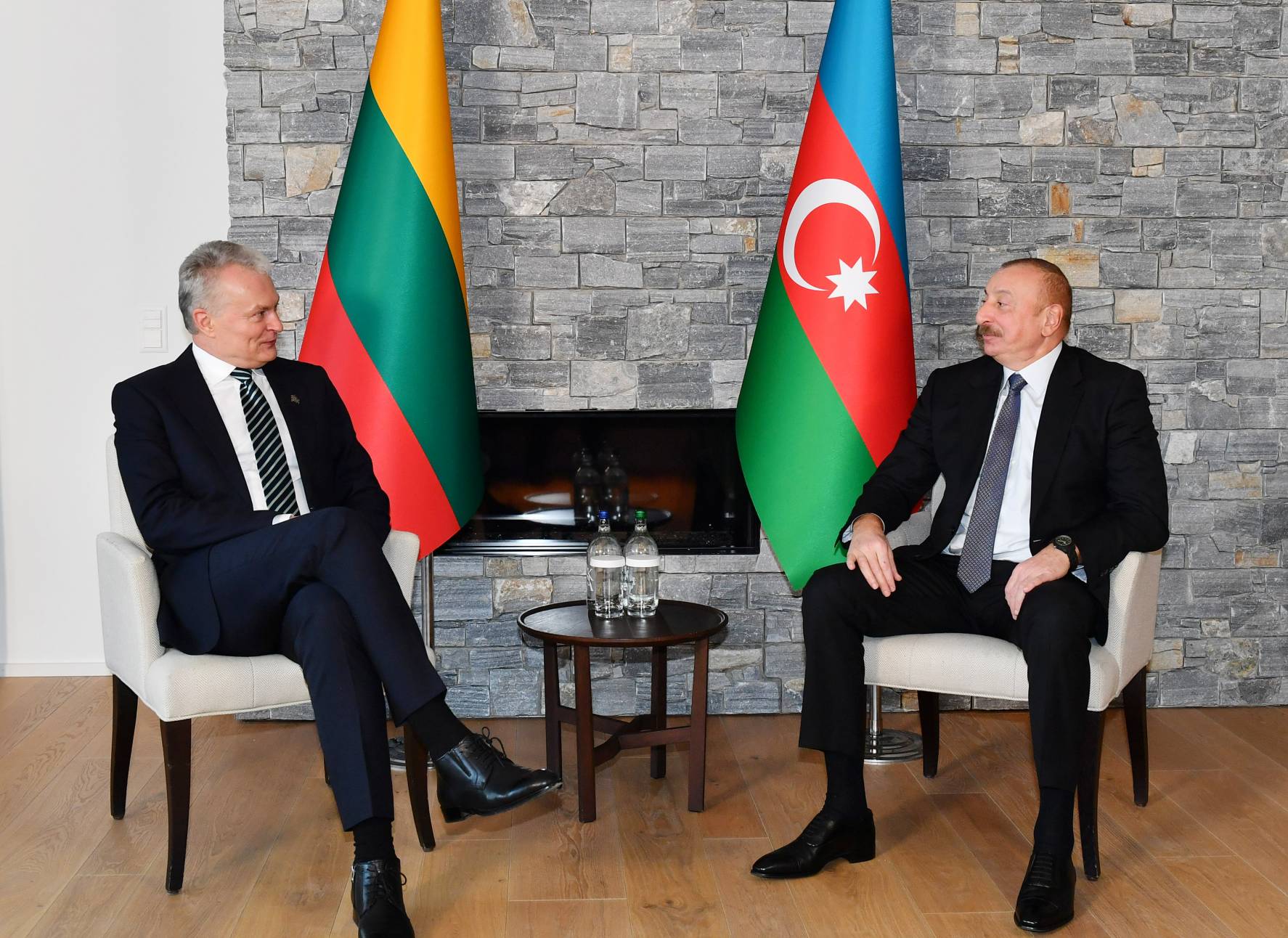
4.1.3. Russia
Nausėda has maintained a firm stance against Russia. During a meeting in Berlin with German Chancellor Angela Merkel in August 2019, he urged her to maintain sanctions against Russia. In an interview with LRT on 14 August, he reiterated his long-held position that a potential meeting with Russian President Vladimir Putin would be "pointless," citing Lithuania's perception of "the true danger" and "risks" of being on the border with Russia.
On 24 February 2022, Nausėda strongly condemned the 2022 Russian invasion of Ukraine and called for heavy sanctions on Russia. In March 2023, he accused China of supporting Russia, stating that "the aim of China is to continue this war, to make this war even more bloody."
4.1.4. Ukraine
Lithuania, under Nausėda's leadership, has been a staunch supporter of Ukraine. In November 2019, he commented on the Steinmeier formula, suggested by Ukrainian President Volodymyr Zelenskyy as a solution to the Russo-Ukrainian War, stating that it was "more profitable for Russia than Ukraine."
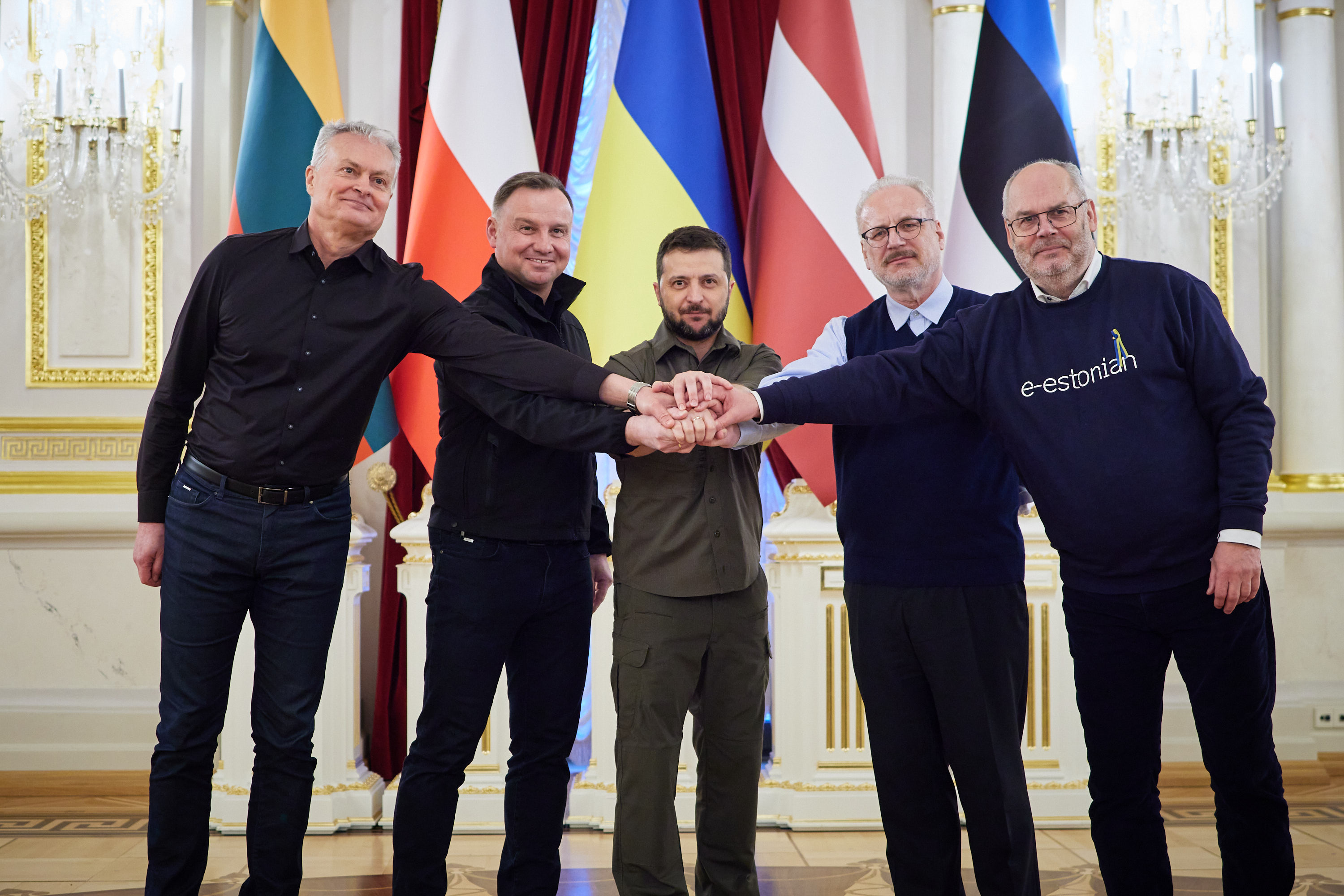
On 23 February 2022, the day before the 2022 Russian invasion of Ukraine, President Nausėda, along with his Polish counterpart Andrzej Duda, visited Zelenskyy in Kyiv to express solidarity and support. During the visit, Nausėda affirmed, "In the face of Russian aggression, Ukraine will not be left alone... We will support Ukraine with all possible means." Following the invasion, Nausėda called for comprehensive military, economic, and humanitarian aid for Ukraine. On 13 April 2022, Nausėda, along with the Presidents of Poland, Latvia, and Estonia, visited Borodianka, a town northwest of Kyiv, to inspect high-rise buildings damaged by Russian forces and later met with President Zelenskyy in Kyiv to express full support for Ukraine. He returned to Kyiv on 28 July 2022, and again on 23-24 August 2023 for Ukraine's Independence Day, where he delivered an address to the Ukrainian people. In April 2024, Nausėda voiced support for the repatriation of military-age Ukrainian men living in Lithuania to Ukraine to be drafted into the Ukrainian army.
4.1.5. Taiwan
In January 2022, a diplomatic dispute arose when Nausėda criticized the Lithuanian government's decision to name a de facto embassy of Taiwan with the inclusion of "Taiwanese" in its title. This act was interpreted by the People's Republic of China as a breach of the One China policy and led to a degradation in political and economic relations. The President clarified that while he did not object to the opening of the embassy itself, he was not consulted on the controversial naming decision. In November 2024, Nausėda expressed support for the declared intention of presumptive Prime Minister Gintautas Paluckas to restore diplomatic ties with China.
4.1.6. Israel
Following the Iranian attack on Israel in April 2024, Nausėda criticized what he termed "unacceptable double standards" among European countries and the United States regarding military aid to Ukraine and Israel. He argued that "if we are principled and really stand for democratic values, we should support both [countries], and not calculate - we give this much to one and that much to the other."
4.2. Domestic politics and government relations
Nausėda's presidency has been marked by a dynamic and sometimes challenging relationship with the Lithuanian government, particularly with the centre-right ruling coalition led by Prime Minister Ingrida Šimonytė.
He publicly broke with the government's decision to establish a de facto embassy of Taiwan using the country's name in the title, an issue that caused significant diplomatic tensions with China.
4.2.1. Possible impeachment
In February 2021, allegations surfaced regarding discussions within the ruling coalition about potentially impeaching President Nausėda. These talks reportedly stemmed from two situations: his alleged interference in the appointment of military intelligence commanders, which is typically the duty of the Minister of Defence, and his participation in the European Council, which some conservatives argued was the prerogative of the Prime Minister. However, politicians from the ruling party denied these claims.
4.2.2. Prospective relations with centre-left ruling coalition
After the first round of the 2024 Lithuanian parliamentary election in October 2024, which saw favorable results for the Lithuanian Social Democratic Party (LSDP), Nausėda expressed his expectation that relations with a future centre-left government would be more productive than those with the outgoing centre-right government. He anticipated no major changes to the country's foreign policy but did foresee positive changes in domestic policies.
Following the second round, when LSDP chair Vilija Blinkevičiūtė unexpectedly declined the position of prime minister, leading to the nomination of Gintautas Paluckas, Nausėda urged the Social Democrats to focus on forming a coalition and developing a political program. He agreed with Paluckas's stated intention to restore diplomatic ties with China. However, Nausėda criticized the Social Democrats' decision to invite the nationalist party Dawn of Nemunas into the ruling coalition. The inclusion of Dawn of Nemunas in the government drew international criticism due to antisemitic remarks made by the party's founder, Remigijus Žemaitaitis.
4.3. International trips
As President, Gitanas Nausėda frequently leads Lithuanian diplomatic, academic, and business delegations worldwide to promote and advance Lithuanian interests. This includes defending the nation's interests regionally, particularly in light of the ongoing Russian invasion of Ukraine, and internationally to foster Lithuanian business and industry, and establish ties with other states. Since 2019, Nausėda has undertaken 79 international trips, including 13 to Belgium for European Union meetings, 8 to Poland, 6 to Germany, and 4 to the United States for sessions of the United Nations General Assembly. His most recent visit was to Australia, where he spent a day in both Melbourne and Canberra.

Nausėda has also welcomed numerous foreign leaders and dignitaries to Lithuania since taking office, including Latvian President Egils Levits, Polish President Andrzej Duda, Ukrainian President Volodymyr Zelenskyy, and Canadian Governor-General Julie Payette.
| Date | Country | City | Reason |
|---|---|---|---|
| 16 July 2019 | Poland | Warsaw | Talks with President Andrzej Duda |
| 23 July 2019 | Latvia | Riga | Talks with President Egils Levits |
| 14-15 August 2019 | Germany | Berlin | Talks with German Chancellor Angela Merkel |
| 15 August 2019 | Germany | Berlin | Talks with Federal President Frank-Walter Steinmeier |
| 20 August 2019 | Estonia | Tallinn | Talks with President Kersti Kaljulaid |
| 1 September 2019 | Poland | Warsaw | 80th anniversary of the September campaign |
| 4-5 September 2019 | European Union | Brussels | European Conference |
| 22-26 September 2019 | United Nations | New York City | United Nations General Assembly |
| 17-18 October 2019 | European Union | Brussels | European Conference |
| 21-24 October 2019 | Japan | Tokyo | Enthronement of Japanese Emperor Naruhito |
| 5 November 2019 | Finland | Helsinki | Talks with President Sauli Niinistö |
| 7 November 2019 | Vatican City | Vatican City | Talks with Pope Francis |
| 7-8 November 2019 | Italy | Rome | Talks with Italian leaders |
| 3-4 December 2019 | United Kingdom | London | 2019 London summit |
| 20 January 2020 | Switzerland | Davos | World Economic Forum |
| 27 January 2020 | Poland | Oświęcim | 75th Anniversary of the Liberation of Auschwitz |
| 11 February 2020 | European Union | Brussels | Talks with President of the European Council Charles Michel |
| 14 February 2020 | Germany | Munich | Munich Security Conference 2020 |
| 15 July 2020 | Poland | Grunwald | 610th Anniversary of the Battle of Grunwald and talks with President Andrzej Duda |
| 17-21 July 2020 | European Union | Brussels | European Conference |
| 1-2 September 2020 | European Union | Brussels | Meeting of the European Council |
| 15-16 September 2020 | European Union | Brussels | Meeting of the European Council |
| 10-11 December 2020 | European Union | Brussels | Meeting of the European Council |
| 17-19 March 2021 | Ukraine | Kyiv | Talks with President Volodymyr Zelenskyy |
| 3 May 2021 | Poland | Warsaw | 230th Anniversary of the Constitution of 3 May |
| 6-8 May 2021 | Portugal | Lisbon, Porto | European Leaders' Meeting |
| 13-14 May 2021 | Moldova | Chișinău | Talks with President Maia Sandu |
| 24-25 May 2021 | European Union | Brussels | Meeting of the European Council |
| 10-11 June 2021 | Georgia | Tbilisi | Talks with President Salome Zourabichvili |
| 13 June 2021 | European Union | Brussels | Talks with Turkish President Recep Tayyip Erdoğan |
| 14 June 2021 | European Union | Brussels | NATO Conference and talks with United States President Joe Biden |
| 15-16 June 2021 | Sweden | Stockholm | Talks with King Carl XVI Gustaf, Speaker Andreas Norlén and Prime Minister Stefan Löfven |
| 23-24 August 2021 | Ukraine | Kyiv | Attended Crimea Platform and Kyiv Independence Day Parade |
| 15-16 September 2021 | Germany | Berlin | Talks with Chancellor Angela Merkel |
| 20-22 September 2021 | United States | New York City | Meeting of the United Nations |
| 22-24 September 2021 | United States | Chicago | Reception with the American-Lithuanian community of Chicago |
| 5-6 October 2021 | Slovenia | Ljubljana | Talks with President Borut Pahor |
| 21-22 October 2021 | Belgium | Brussels | Talks with Prime Minister Alexander De Croo |
| 1-2 November 2021 | United Kingdom | Glasgow | Tour of Scotland and reception with Scottish leaders |
| 29-30 November 2021 | France | Paris | Talks with President Emmanuel Macron |
| 23-25 May 2022 | Switzerland | Davos | Meeting of the World Economic Forum |
| 28-30 June 2022 | Spain | Madrid | Attendance to the 32nd NATO summit |
| 28 July 2022 | Ukraine | Kyiv | Meeting with President Volodymyr Zelenskyy |
| 25-26 August 2022 | Iceland | Reykjavík | Reception with President Guðni Th. Jóhannesson |
| 18-19 September 2022 | United Kingdom | London | Attendance to the state funeral of Elizabeth II |
| 20-22 September 2022 | United States | New York City | Attendance to the 77th United Nations General Assembly |
| 6-7 October 2022 | Czech Republic | Prague | Tour of Czechia and talks with Czech leaders |
| 6 December 2022 | Albania | Tirane | EU-Western Balkans summit |
| 14 December 2022 | Belgium | Brussels | Attendance to the European Council |
| 19 December 2022 | Latvia | Riga | Summit of the member countries of the Joint Expeditionary Force |
| 17-18 January 2023 | Switzerland | Davos | Meeting of the World Economic Forum |
| 24-25 January 2023 | Poland | Warsaw | Reception with President Andrzej Duda |
| 10-12 February 2023 | European Union | Brussels | Meeting of the European Council |
| 13-14 February 2023 | Norway | Oslo | Talks with Prime Minister Jonas Gahr Støre and reception with King Harald V of Norway |
| 17-18 February 2023 | Germany | Munich | Meeting of the Munich Security Conference, talks with President Emmanuel Macron, President Egils Levits and Prime Minister Kaja Kallas |
| 23 February 2023 | Poland | Warsaw | Extraordinary Summit of the Bucharest Nine due to the Ukraine conflict, talks with President Joe Biden |
| 14 March 2023 | European Union | Brussels | Address to members of the European Parliament |
| 23-24 March 2023 | European Union | Brussels | Meeting of the European Council |
| 17-18 April 2023 | Netherlands | Amsterdam | Talks with Prime Minister Mark Rutte, King William Alexander and Head of the International Criminal Court Judge Piotr Hofmański |
| 26-28 April 2023 | Germany | Berlin | Talks with Chancellor Olaf Scholz and NATO leaders |
| 6-7 May 2023 | United Kingdom | London | Attendance to the Coronation of King Charles III |
| 10-11 May 2023 | Spain | Madrid | Talks with Prime Minister Pedro Sánchez and King Felipe VI |
| 12 May 2023 | Portugal | Lisbon | Talks with President Marcelo Rebelo de Sousa |
| 25-26 May 2023 | France | Paris | Reception and talks with President Emmanuel Macron |
| 2 June 2023 | Moldova | Chișinău | Talks with President Volodymyr Zelenskyy |
| 28 June 2023 | Netherlands | The Hague | Talks with Prime Minister Mark Rutte and Secretary-General Jens Stoltenberg |
| 6-7 June 2023 | Slovakia | Bratislava | Meeting with NATO leaders and talks with Secretary-General Jens Stoltenberg |
| 27 June 2023 | Netherlands | The Hague | Talks with Prime Minister Mark Rutte and Secretary-General Jens Stoltenberg |
| 28-30 June 2023 | Ukraine | Kyiv | Reception with President Volodymyr Zelenskyy and tour of Kyiv with President Andrzej Duda |
| 18 July 2023 | European Union | Brussels | EU and Latin American and Caribbean Leaders' Summit |
| 3 August 2023 | Poland | Suwalki | Talks with Prime Minister Mateusz Morawiecki |
| 23-24 August 2023 | Ukraine | Kyiv | Reception with President Volodymyr Zelenskyy and address to the Ukrainian people for Independence Day of Ukraine |
| 19-22 September 2023 | United Nations | New York City | Address to the United Nations General Assembly and reception with President Joe Biden |
| 23-25 September 2023 | United States | Los Angeles | Reception with the American-Lithuanian community of Los Angeles |
| 5-6 October 2023 | Spain | Granada | Meeting of NATO leader and talks with President Volodymyr Zelenskyy |
| 17-18 October 2023 | Australia | Melbourne | Reception with the Australian-Lithuanian community of Melbourne and leaders of RMIT University |
| 19-20 October 2023 | Australia | Canberra | Reception with Prime Minister Anthony Albanese and Premier Peter Malinauskas |
5. Political positions and ideology
Gitanas Nausėda's political philosophy has evolved over time, reflecting a nuanced blend of conservative and social democratic principles, particularly concerning economic and social issues.
5.1. Ideological self-description
During his 2019 presidential campaign, Nausėda described himself as a "compassionate conservative." However, some political scientists have found his political views difficult to precisely define, noting that they are heavily influenced by economic arguments rather than a clear ideology. According to Lauras Bielinis, Nausėda's background as an economist and his activities in banking remain essential factors in his political decisions.
By 2024, Nausėda claimed that his vision "partially or, I would say to a large extent, coincides with the social democratic point of view." This shift was further underscored by the fact that his 2024 bid for re-election was endorsed by the Lithuanian Social Democratic Party and the Lithuanian Regions Party.
6. Personal life
Gitanas Nausėda's personal life reflects his family values, diverse interests, and linguistic abilities.
His father, Antanas Nausėda (1929-2022), was an engineer, and his mother, Stasė Nausėdienė (1931-2014), was a physics and mathematics teacher. His sister, Vilija, born in 1959, is an economist. In 1990, he married Diana Nepaitė-Nausėdienė. They have two daughters.
In addition to his native Lithuanian, Gitanas Nausėda is proficient in German, English, and Russian. His hobbies include chess, reading, sports, and playing the guitar. Since 1997, he has been an avid collector of antique books.
7. Controversies
Throughout his career, Gitanas Nausėda has faced several significant controversies, ranging from environmental concerns to allegations of conflict of interest and past political affiliations.
7.1. Private house in a regional park
Environmentalists have criticized Gitanas Nausėda for constructing a modern private house within Pavilniai Regional Park, specifically near the Pūčkoriai exposure, a unique geological formation designated as a nature monument in 1974. Nausėda, who was an advisor for SEB Bankas at the time of construction, maintained that he had obtained a legal permit. The Directorate of the Pavilniai Regional Park attempted to challenge the permit but was unsuccessful. Nausėda commented, "It's a shame that people till this day can't admit being wrong and that the court had acknowledged this as well. That time I showed good will and did not demand the court to ask money from them for a lawsuit that lasted for 2-3 years. But it seems people don't get that."
According to Vida Petiukonienė, the director of the Pavilniai Regional Park Directorate, despite experts confirming that the permit for a modern house in the park was not in accordance with the law, the court ordered them to reconcile the project. Petiukonienė expressed her dismay, stating, "This is the reality of life, this is how things work in this world, we can only feel sorry. The situation we are in is one of those ridiculous instances, a mockery of the country, laws, and people who go to work in order to commit to these laws. In other words, us."
7.2. Conflict of interest
President Nausėda faced criticism for his decision to visit his daughter, who was studying in South Korea, during an official state visit to Japan in 2019. This personal detour during an official trip raised concerns about a potential conflict of interest. Nausėda later apologized for the incident in 2023 during his announcement of seeking re-election, acknowledging that it was "fundamentally wrong."
7.3. The Whistleblower and the President controversy
In 2023, investigative journalists Dovydas Pancerovas and Birutė Davidonytė published a book titled The Whistleblower and the President (Pranešėjas ir PrezidentasLithuanian). The book contained revelations about unreported funding for Nausėda's presidential campaign and detailed his relationships with various business groups.
Following the book's publication, Members of Parliament from the Lithuanian Farmers and Greens Union claimed that an alleged conspiracy group, referred to as "the Statesmen," was attempting to discredit the incumbent president. They proposed an investigation into the activities of this purported "statesmen" group. Nausėda's team subsequently participated in the revival of this conspiracy theory. In January 2024, Frederikas Jansonas, Nausėda's chief advisor, alleged that delays in appointing ambassadors were due to sabotage by "statesmen," whom he claimed were allied with the Šimonytė Cabinet. Jansonas identified government members, such as Žygimantas Pavilionis, as individuals listed in a 2008 "List of the Statesmen." These allegations were, however, dismissed by Albinas Januška.
7.4. Communist Party membership controversy
In 2023, a significant controversy emerged when it was revealed that Gitanas Nausėda had been a member of the Communist Party of the Soviet Union. Documents, which identified him by a Russified form of his name, Gitanas Antanovich Nauseda, showed that he joined the CPSU on 20 May 1988, and received his party ticket on 27 June of the same year.
The information about his past membership was first uncovered by journalist Dovydas Pancerovas, working for Laisvės TV, who found the details in the Lithuanian State Historical Archives. The controversy intensified because Nausėda had not disclosed this information when filing his candidacy for the presidency, leading to public debate and criticism.
8. Honours and awards
Gitanas Nausėda has received numerous national and international honours, awards, and honorary doctorates in recognition of his service and contributions.
8.1. National honours
- Medal of Merit to Neringa's Municipality (2016)
- Lithuania: Grand Master and Grand Cross with Golden Chain of the Order of Vytautas the Great (12 July 2019)
8.2. Foreign honours
8.3. Honorary doctorates
- Japan: Gifu University (24 October 2019)